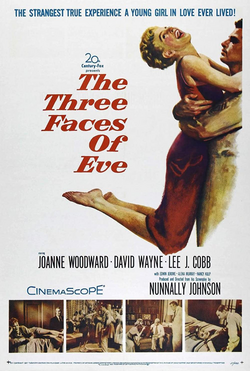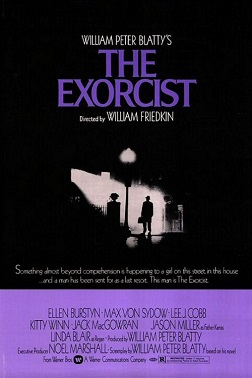Have you ever started watching something and asked yourself, "Why did they bother to make this?" The Exorcist III screams out that question. Boring, unintentionally hilarious, with no sense whatsoever, The Exorcist III is a total disaster.
It has been fifteen years since the events of the original. Detective Kinderman (George C. Scott) continues a friendship with Father Joe Dyer (Ed Fladers), who comfort each other on the anniversary of the death of their mutual friend, Father Damien Karras. Kinderman is in the midst of an investigation of a set of serial murders which are eerily similar to those of The Gemini Killer.
There is only one problem. The Gemini Killer is dead, executed years ago. Is there a copycat killer out there? Kinderman has an even more horrifying theory: the Gemini Killer is back. Could he really have returned from the dead? The case becomes personal once Father Dyer finds himself another one of this serial killer's victims. As more deaths begin plaguing the hospital that Father Dyer was at, we see that Karras is simultaneously alive and dead.
While the body may be that of Karras, inside him is the soul of James Venamun (Brad Dourif), the original Gemini Killer. Will Kinderman be able to stop Venamun and his "Master" from killing more? Will Father Morning (Nicol Williamson) be able to expel the evil being from Karras' body?
For as often as Exorcist II: The Heretic gets listed among the worst sequels ever made, I wonder if any of them has bothered checking out The Exorcist III. I am nowhere near saying that Exorcist II: The Heretic is any good. However, it had at least Richard Burton's wild overacting to make it bizarrely watchable. The Exorcist III could not even give us that.
To be fair, George C. Scott was doing his best to be his absolute worst in The Exorcist III. It is a thoroughly uneven performance, sometimes raging comically, sometimes looking literally sedated. His rapport with Flanders is nonexistent. No one would believe that these two even knew who the other was, let alone believe that they were longtime friends. Flanders was particularly appalling as Dyer, delivering all his lines in the same curt manner. Both he and Scott rattled their lines off each other in the same way, a robotic delivery that sounds as if it being punched out by a machine.
One feels for both Miller and Dourif, who are trying so hard to be menacing but still end up looking ridiculous. I feel especially for Miller, who agreed to be dragged into this fiasco. Father Karras' death in The Exorcist was moving and impactful. To upend all that by saying that his body was still running around and possessed by a serial killer is more than laughable. It undercuts the poignancy of The Exorcist and does not make any sense.
Dourif, forced to act in one room and chained up, did his best to make James Venamun/The Gemini Killer menacing and evil. I do feel for him as again, I think he did what he could. It did not work, but I think that has to do with the one masterminding the production.
William Peter Blatty, who wrote the original novel The Exorcist and won the Adapted Screenplay Oscar for the film, does double duty as both writer and director of The Exorcist III. I find that more often than not, first-time directors become fixated on the look of the film rather than what is actually on the screen. He wants to give moments of fright, and to be fair there is at least one moment of mild shock when a ghostly figure stalks a nurse.However, a lot of The Exorcist III is hilarious rather than horrifying. Of particular note are two scenes. The first is a dream sequence where Kinderman goes to what is best described as the Heavenly Grand Central Terminal. The station where people are awaiting to go somewhere heavenly looks cheap. You have odd cameos from Samuel L. Jackson and romance novel model Fabio as a blind man and angel respectively. Also popping up for reasons unknown are NBA star Patrick Ewing as the Angel of Death and both former Surgeon General C. Everett Koop and talk show host Larry King in a restaurant. Why they are there one can only guess.
Making that scene the height of hilarity is when Scott comes up to a victim he knows and says almost cheerfully, "I'm sorry you were murdered, Thomas. I miss you". One is left dumbfounded that anyone watching a cut of The Exorcist III thought that this wasn't anything other than laughable.
The second scene is when a possessed nurse goes to Kinderman's home to try and kill him and his family. The choppy editing is bad enough. It is the acting from everyone in the scene that is unspeakably hilarious. Those not asleep by now would be howling with laughter at how poorly acted and staged this supposed terrifying attack was. Blatty was not a director and should never have been given or asked for the job.
The performances save perhaps Miller and Dourif ranged from merely bad to downright funny. There is no sense of tension, menace or suspense throughout. Some lines range from cringe to downright hilarious. Father Dyer tells a nurse, "May the Schwartz be with you". Why he felt the need to randomly quote Spaceballs only Blatty knows. Another time, Kinderman berates his staff by complaining that one of his subordinates wrote that rabies were "Jewish priests". Dourif, I believe, speaks about having "friends on the other side". Granted, this was long before The Princess and the Frog was made. However, one can't hear that line now without hearing Friends on the Other Side in his or her head.
There was no need for The Exorcist III to exist, and now no justification for this entire franchise either. In so many ways, The Exorcist III is a parody of The Exorcist that one wonders if the actual spoof Repossessed was more restrained and intelligent.
































